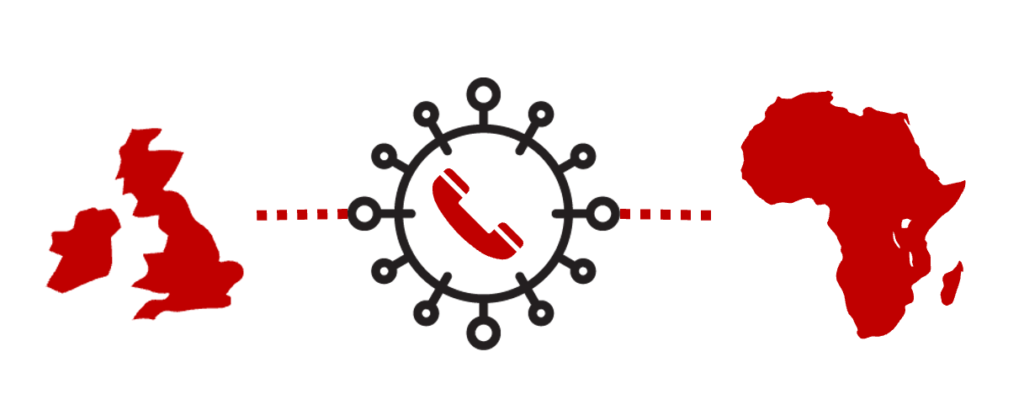
Every organisation has faced their difficulties continuing through COVID, with hospitality sector hit hardest. While some businesses have thrived (those offering digital services, or able to move all their work online) others have been unable to make the transition smoothly.
Here at SVRG we are lucky to be able to work remotely while not travelling, having morning stand-ups each day via video-call, and keeping regularly in touch via WhatsApp. This ease of online communication is sadly not the same for our partner organisations. Although we are able to have weekly catch-up calls, we’ll often find our communication interrupted due to bad signal (I’ll never forget the time we tried to call our partners in-country from a hotel room in Uganda, sitting in pitch black due to 6 mini power cuts, and trying for 30 minutes to get a clear connection where we could hear what our partners were trying to tell us, and even then their voices were so quiet we could barely hear them!). We and our partners have made great progress on improving our effectiveness communicating remotely, but a huge part of that relied on us first building relationships and understanding what methods of communication worked for different people. To work this out effectively when remote communication is so patchy to start with, we really needed in-person time with our partners.
In addition to partner-partner communications, continuing with community engagement is pivotal to the success of our projects. Of course working in off-grid communities without any phone signal, moving our work with them offline is impossible! It is for this reason that we have continued to travel through COVID, to continue engaging with communities and implement their energy systems, and be able to talk freely with our partners without our speech breaking up with sudden interruptions. Productivity soars once we are all able to work together unrestricted by technological barriers.
Of course travelling through COVID brings significant extra costs for tests and quarantine, as well as health risks to us, our partners and the communities we work with. While in Uganda, we are extremely careful to always wear masks when in public, and on our first trip during the pandemic, we maintained distance from our partners at all times until our in-country test results came back negative. Although this did make work challenging, especially as for myself and my colleague Zoe we’d never before met our Ugandan partners and now could only communicate via muffled masked voices without any reassurance from facial expressions and smiles, it was the right thing to do to protect everyone involved. Our partners were especially cautious as they’d had COVID symptoms and were quarantining just before we arrived. We weren’t even sure we’d be able to do any of our work with them as planned! Thankfully their test results came back negative just in time.
As travel is so difficult, we have made changes to how we work to minimise the number of times we fly. This includes making out trips much longer than we would have previously done (all 3 or more weeks, plus quarantine once we get home), and we’ve even flown partners from other countries to meet us out there rather than visiting each individually – On our visit to Uganda in November 2020, one of our partners from Lesotho came to join us to learn our methods in community engagement. This meant he could return to his team, share his new knowledge, and implement it all without our presence. Whilst in theory this could be taught online, due to the interactivity of the engagement activities, and the challenges of connectivity, doing it in person is so much more effective and easier.
COVID is naturally unpredictable, and we’ve learnt to be extremely flexible with travel plans. The 14 day home quarantine period was reduced to 10 days, then changed to a hotel quarantine making travel impossibly expensive. When all red-listed countries were removed, this made our lives much easier, with only a 2 day quarantine on return. The recent Omega variant caused us a lot of concern as we were out travelling when Europe began red-listing all Southern African countries again, prompting us to return home early. And it is not only the UK rules we have to be wary of. Uganda shut its borders to foreigners for a significant portion at the start of the pandemic, and more recently has introduced airport PCR testing on arrival (originally with an airport quarantine until the test result came back, but this was removed after a week due to the incredibly long waits). Kenya introduced quarantine on arrival which adds significant costs to our productivity while travelling. And it was impossible to get to Lesotho for much of last year due to travel restrictions going through South Africa to reach it. With rules and regulations constantly changing, it’s a real battle to keep on track and make sure we can work effectively, travel efficiently, and keep our partners, our families, and the communities safe.
We can only hope that the situation will improve over the next few years, as the Global North share more vaccines and health knowledge, medicines and equipment with those in the Global South.





